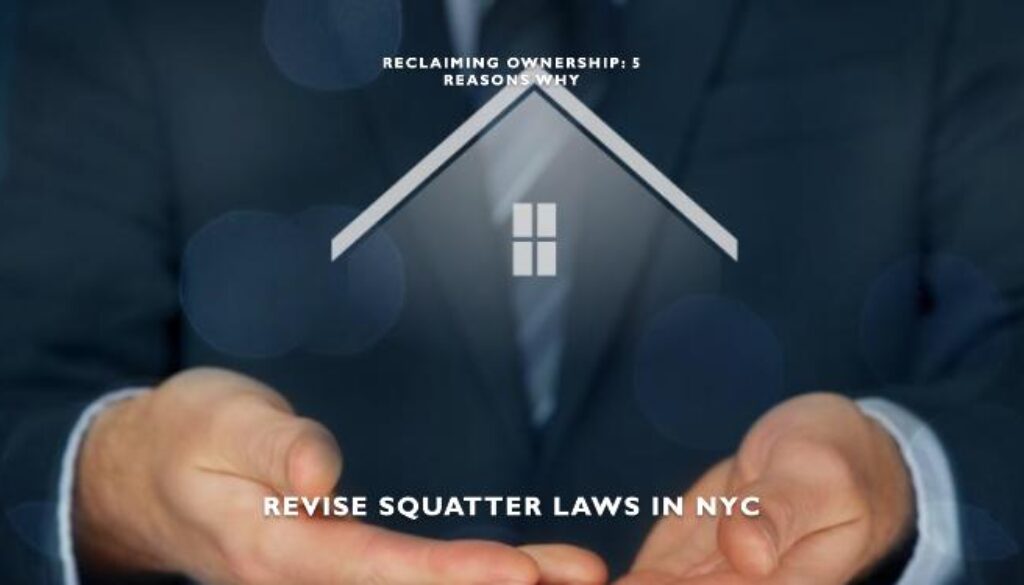4 Reasons NYC Must Revise Squatter Laws: Reclaiming Ownership
Reclaiming Ownership: 4 Reasons NYC Must Revise Squatter Laws
Property Rights at Stake: A Call for Change
Are NYC’s squatter laws too lenient? It’s time for a hard look at the balance between squatter rights and property ownership.
The Tug-of-War Over Property Rights
New York City’s squatter laws have long been a topic of heated debate. With recent high-profile cases bringing the issue to the forefront, many are questioning whether the laws are too lenient, allowing squatters to exploit legal loopholes for their benefit.
Squatter laws in NYC are a contentious issue, with a growing chorus of voices arguing that they unfairly favor squatters over rightful property owners. These laws, meant to offer a safety net, often end up entangling owners in costly legal battles to reclaim their property.
Under current legislation, squatters can claim rights after just 30 days of occupancy, making it challenging for property owners to reclaim their space without a lengthy court process. This has led to situations where homeowners are unable to evict squatters without enduring legal battles that can stretch on for years.
However, change may be on the horizon. A new bill has been proposed to tighten these laws, extending the period for tenancy rights from 30 to 45 days and adding squatting to the definition of criminal trespass. This could empower property owners and law enforcement to act more swiftly and effectively against squatters.
Four Areas Where Squatter Laws Fall Short
- Legal Loopholes Exploited
Squatters can sometimes manipulate legal loopholes to claim ownership, leaving property owners out in the cold.
- Financial Burdens on Owners
The cost of eviction proceedings and property damage can be astronomical, unfairly burdening the owners.
- Inadequate Protection for Owners
Current laws don’t offer enough safeguards for owners, who can lose their property rights to squatters.
- Impact on Neighborhoods
While some squatters may improve properties, others lead to neglect and a decline in community standards.
Protecting Your Property: 4 Smart Strategies
This 30-day window can feel like a landlord’s worst nightmare. But fear not! Here are some proactive steps you can take:
- Regularly inspect your properties: Vacant properties are prime targets for squatters. Conduct regular inspections to identify signs of unwanted occupancy early on.
- Secure your property: Make sure all entry points are secure with strong locks and deadbolts. Consider installing security systems or alarms for added peace of mind.
- Maintain open communication with neighbors: Neighbors can be your eyes and ears. Encourage them to report any suspicious activity around your property.
- Stay informed about legal updates: Squatter laws can be complex and ever-changing. Consult a lawyer specializing in landlord-tenant law to understand your rights and responsibilities.
Frequently Asked Questions
- What rights do property owners have against squatters?
Limited, often requiring lengthy legal processes to enforce.
- How can squatter laws be changed to protect owners?
By tightening the criteria for adverse possession and streamlining eviction procedures.
- What’s the economic impact of squatter laws on owners?
Significant, with legal fees and property devaluation.
- Can squatters be evicted easily in NYC?
No, it’s a complex process that can take months or even years.
- Do squatter laws vary by state?
Yes, and some are more owner-friendly than others.
In Conclusion: Time to Stand Up for Property Rights
The imbalance in NYC’s squatter laws needs urgent redress. Property owners deserve stronger protections to prevent unlawful occupation and ensure their rights are not overshadowed. [Discover more about property rights and legal options] (https://www.nycourts.gov).
External Resource: For a more detailed look at NYC squatter laws, visit the official NYC Department of Housing Preservation and Development website (https://www.nyc.gov/site/hpd/services-and-information/tenants-rights-and-responsibilities.page).
What’s your take on this issue? Are the current laws protecting the vulnerable, or are they giving too much leeway to those who would abuse the system? Join the conversation and share your thoughts below.
My Business Web Space may earn an Affiliate Commission if you purchase something through recommended links in this article.
Discover more from My Business Web Space
Subscribe to get the latest posts sent to your email.


